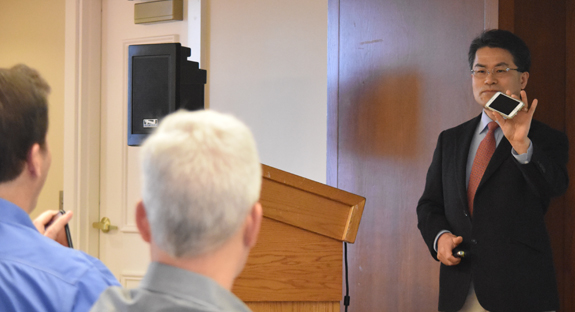Recipients of Chancellor’s Innovation Commercialization Funds Announced

The University of Pittsburgh Innovation Institute has awarded a total of $140,000 to four Pitt Innovator teams to help them move their discoveries toward commercialization.
The Chancellor’s Innovation Commercialization Funds were established to support promising early-stage Pitt innovations to assist in reducing the technical and market risk associated with the innovations and make them more attractive to investors and potential licensees.
“We are thrilled to be able to provide these funds to entrepreneurial Pitt faculty and graduate students to help expedite their commercialization journey,” said Marc Malandro, founding director of the Innovation Institute. “Often the most difficult hurdle to climb for commercializing University research is providing so-called ‘gap’ funding that can bridge the space between a promising idea and a marketable product.”
The teams were selected by a panel of judges from a pool of two dozen applicants that was narrowed to 10 finalists. The judges included several members of the region’s innovation and entrepreneurship community, including: Nehal Bhojak, director of innovation at Idea Foundry; Malcolm Handelsman, president of the Pittsburgh Chapter of Keiretsu Forum; James Jordan, president of Pittsburgh Life Sciences Greenhouse; Andy Kuzneski, president of Kuzneski Financial Group; Rich Lunak, president and CEO of Innovation Works; and Mike Stubler, managing director of Draper Triangle Ventures.
Two $35,000 awards spur innovation with the help of a one-to-one matching partner:
Thermoresponsive Hydrogel for Orbital Volume Augmentation
Morgan Fedorchak, assistant professor in the departments of Ophthalmology, of Chemical and Petroleum Engineering, and in the Clinical and Translational Science Institute, and Jenny Yu, assistant professor and vice chair, clinical operations, Department of Ophthalmology, have discovered a non-degradable hydrogel material that can be injected into the orbit of the eye following trauma, or as a treatment for genetic eye disorders. The material can also be used to administer anti-inflammatory or antibiotic medications.
The funding will be used to provide proof-of-concept studies. Data from the successful completion of the studies will better position the innovation for Department of Defense funding to explore the therapeutic potential of the technology. Matching funds will come from the University of Pittsburgh Center for Military Medicine Research, whose mission is to address combat-related injuries.
BodyExplorer: Autonomous Simulated Patient
Douglas Nelson Jr., doctoral candidate in the Department of Bioengineering, John O’Donnell, professor and chair of the Department of Nurse Anesthesia program, and Joseph Samosky, assistant professor in the Department of Bioengineering have developed a mannequin medical simulator with projected augmented reality for training medical professionals in anatomy, physiology, and clinical procedures.
The team previously participated in the Coulter Translational Research Partners II Program and the Idea Foundry’s Science Accelerator to advance prototype development and usability testing. The new funding will allow for improvements to the user interface and expansion of the BodyExplorer curriculum modules.
Idea Foundry is providing 1:1 matching cash support, in addition to $25,000 of additional in-kind support to assist in securing additional investment.
And two projects received $35,000 awards without a matching requirement:
Nano-LED Technology for Microdisplays
Hong Koo Kim, Bell of Pennsylvania/Bell Atlantic Professor, Department of Electrical and Computer Engineering, and doctoral student Daud Hasan Emon have developed nano-LED structures that have lower energy costs and longer battery life than existing LED technology. Applications include mobile device displays and other micro-display devices. The funding will support the advancement of prototypes to demonstrate the breadth of potential uses.
Reactive Extraction of Water: Desalination Without Membranes or Distillation
Eric Beckman, Distinguished Service Professor of Chemical and Petroleum Engineering, has developed a chemical method for desalinating water that requires less energy than longstanding existing methods such as reverse osmosis or flash distillation. The award will fund testing to validate the technology.
Malandro said the Innovation Institute is working with those teams not chosen in this funding round to receive other education and funding opportunities to advance their discoveries.
The Pitt Ventures First Gear Program is an NSF I-Corps Site participant that provides an initial grant of $3,000 for teams to conduct customer discovery and value proposition activities. At the conclusion of each six-week First Gear cohort, teams pitch their ideas for the opportunity to receive from $5,000 to $20,000 from the Chancellor’s Innovation Commercialization Funds program. The teams are also eligible to apply for a second round of NSF funding of up to $50,000 from the national I-Corps program.
Other Stories From This Issue
On the Freedom Road

Follow a group of Pitt students on the Returning to the Roots of Civil Rights bus tour, a nine-day, 2,300-mile journey crisscrossing five states.
Day 1: The Awakening
Day 2: Deep Impressions
Day 3: Music, Montgomery, and More
Day 4: Looking Back, Looking Forward
Day 5: Learning to Remember
Day 6: The Mountaintop
Day 7: Slavery and Beyond
Day 8: Lessons to Bring Home
Day 9: Final Lessons

